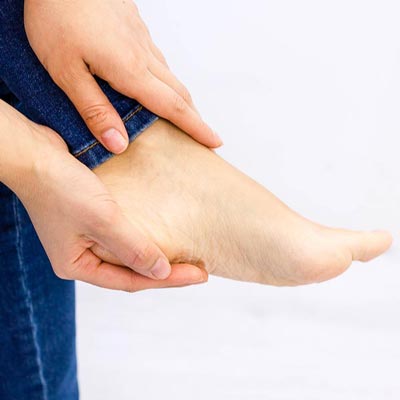Heel Pain Doctor Near Me Northern Arizona University
Heel pain is a common condition that affects millions of people around the world. It can be caused by various factors, such as overuse, improper footwear, or an underlying medical condition. Whatever the cause may be, heel pain can be excruciating, limiting your mobility and disrupting your daily life. That’s why it’s important to seek professional help from a heel pain doctor near Northern Arizona University. In this ultimate guide, we’ll delve into everything you need to know about finding relief from heel pain. From the causes and symptoms, to the various treatment options available, and how to find the best heel pain doctor near you, we’ve got you covered. Read on to discover how you can free yourself from the agony of heel pain and take back your life.
What Is Heel Pain and What Are Its Common Causes
Heel pain can be excruciating, and it affects people of all ages. It is important to understand what causes it to prevent further damage and relieve pain. Heel pain can occur due to several reasons, the most common being plantar fasciitis. Plantar fasciitis is inflammation of the plantar fascia, which is a thick band of tissue that runs from the heel bone to the toes. This condition is prevalent among runners, overweight individuals, and people who stand for extended periods.
Another common cause of heel pain is Achilles tendonitis. The Achilles tendon connects the calf muscles to the heel bone and can become inflamed due to repetitive strain or overuse. Middle-aged athletes who participate in sports such as basketball, running, and tennis are more susceptible to developing Achilles tendonitis.
Heel spurs are another common cause of heel pain. They are abnormal bony growths that occur on the underside of the heel bone. They are often associated with plantar fasciitis and can be quite painful, especially when walking or standing for extended periods. Heel spurs are caused by a change in foot mechanics, which can be the result of wearing ill-fitting shoes or prolonged standing on hard surfaces. Understanding the causes of heel pain is crucial in preventing further damage and treating the underlying condition.

Heel Care Northern Arizona University
How to Diagnose Heel Pain
Heel pain is a debilitating condition that can dramatically impact your daily life, demanding immediate attention. Understanding the underlying cause is crucial for tailored treatment and prevention of further damage. Let’s explore some common causes, such as plantar fasciitis, heel spurs, and Achilles tendonitis, each exhibiting distinct symptoms and requiring specific treatment approaches.
A comprehensive physical examination is essential for accurate diagnosis. Your doctor will inquire about your medical history, recent activities, and conduct a series of tests to evaluate your foot and ankle. These assessments may involve X-rays, ultrasounds, and MRIs, aiding in identifying the root cause of your symptoms.
Once the cause of your heel pain is determined, a personalized treatment plan will be devised. It may involve a combination of rest, ice, compression, and elevation, along with the use of supportive footwear or custom orthotics. In severe cases, surgical intervention might be necessary to correct the underlying issue. Remember, seeking prompt medical attention is pivotal for a speedy and complete recovery.
Understanding the impact of heel pain on your daily life, we strive to improve your quality of life sooner rather than later. Our goal is to provide comprehensive care, tailored to your needs, helping you regain your comfort and mobility once again.
Benefits of Seeing a Heel Pain Doctor Near Me
Heel pain can be a debilitating issue that can affect your quality of life. Whether your heel pain is caused by plantar fasciitis, Achilles tendonitis, or any other foot-related condition, visiting a heel pain doctor near you can provide significant benefits. First, heel pain doctors are specialized in diagnosing and treating foot and ankle disorders, meaning they have the knowledge and expertise to help alleviate your pain. They can provide you with guidance on the proper footwear, exercises, and other non-invasive treatments to help relieve your pain and maintain optimal foot health.
Second, a heel pain doctor near you can also offer access to advanced diagnostic technology and treatment options. With the use of advanced imaging technology like X-rays, MRI, and ultrasound, heel pain doctors are better equipped to accurately diagnose your condition and develop an effective treatment plan tailored to your specific needs. Additionally, if non-invasive treatments are not effective, a heel pain doctor can offer surgical options to provide long-term relief.
Lastly, seeing a heel pain doctor near you can also save you time and money. As a highly specialized practitioner, a heel pain doctor is better equipped to diagnose and treat your condition effectively, allowing you to avoid costly and time-consuming treatments that may not address the root cause of your pain. Furthermore, by providing preventative care and early intervention, a heel pain doctor can help you avoid more severe foot-related issues down the road, ultimately saving you both time and money in the long run. Visiting a heel pain doctor near you can provide many benefits. Not only can they help alleviate your pain and improve your quality of life, but they can also offer access to advanced diagnostic technology and treatments while saving you time and money.
Treatments for Heel Pain
Heel pain can be a debilitating experience, severely impacting your mobility and restricting your activities. Fortunately, there are various options of treatments available for heel pain.
One commonly used treatment is the RICE protocol, which stands for rest, ice, compression, and elevation. This protocol aims to reduce swelling, improve circulation, and alleviate pain in the heel. Physical therapy is another beneficial option for heel pain. It focuses on enhancing foot strength and flexibility to reduce inflammation and enhance range of motion.
Orthotics or heel cups can provide extra support, cushioning, and stability to the foot, while pain relief medications offer temporary relief from discomfort. Corticosteroid injections are also effective for reducing inflammation and swelling, providing rapid symptom relief. However, it’s important to note that these injections should not be used frequently or for extended periods due to potential side effects.
With all the available treatment options, it’s crucial to seek medical advice to determine the best course of action for your specific needs. Remember, early intervention and proper treatment can significantly improve your quality of life. Don’t let heel pain hold you back from enjoying your daily activities. Take the necessary steps to alleviate the pain and restore your mobility.
Addressing heel pain requires a comprehensive approach that includes rest, physical therapy, orthotics, pain relief medications, and corticosteroid injections. By following the right treatment plan and consulting with a healthcare professional, you can find relief and regain control over your mobility and overall well-being.

Heel Pain Treatment Expert
When to See a Heel Pain Doctor Near You
While it’s always advisable to seek medical attention for persistent or severe heel pain, some specific signs and symptoms may indicate the need for immediate evaluation by a heel pain doctor near you. These include:
- Severe and sudden onset of pain in the heel with no apparent cause.
- Difficulty walking or bearing weight on the affected foot.
- Swelling, redness, or warmth in the heel area.
- History of a recent injury or trauma to the foot or ankle.
- Symptoms that do not improve with rest or home remedies.
- Pain that persists or worsens over time.
- Numbness or tingling in the heel or foot.
If you experience any of these symptoms, it is crucial to seek medical attention from a heel pain doctor near you. They can provide an accurate diagnosis and develop a personalized treatment plan to address your specific condition effectively. Remember, early intervention is key to preventing further complications and achieving a speedy recovery.
Questions to Ask Your Doctor about Heel Pain Treatment
Heel pain can be a frustrating and confusing experience. When seeking medical help, knowing the right questions to ask your doctor becomes crucial for receiving the best treatment. Here are three key questions to consider when discussing your heel pain with a healthcare provider.
What is causing my heel pain? Understanding the underlying cause is vital for effective treatment. From common culprits like plantar fasciitis to Achilles tendinitis, different conditions require different approaches. By identifying the root cause, your doctor can develop a tailored treatment plan that suits your specific needs.
What are the available treatment options? Inquire about the range of treatments for your heel pain. Your doctor may suggest physical therapy, custom orthotics, or even surgical intervention in severe cases. Depending on the severity and cause of your pain, a combination of treatments might be recommended to provide optimal relief and recovery.
What are realistic expectations for my recovery? Discussing your expectations with the doctor is crucial. Some cases of heel pain respond well to conservative treatments within a few weeks, while others require long-term management. By setting clear and realistic expectations together, you can take the necessary steps towards a swift and comfortable recovery.
Other than these key questions, it’s essential to discuss any concerns or questions you may have about your heel pain and treatment options. Your doctor is there to provide you with the necessary information and support to help you make informed decisions regarding your health and well-being. Don’t be afraid to ask for clarification or additional information if needed.
Remember, effective communication with your doctor is key when it comes to resolving heel pain. By asking the right questions, you can gain valuable insights into your condition and make informed decisions about your treatment. Don’t hesitate to seek professional care and start your journey towards an active, pain-free life.

Heel Pain Treatment
Tips for Choosing the Right Heel Pain Doctor Near You
When it comes to seeking help for your heel pain, choosing the right doctor is crucial. Here are some tips to consider when searching for a reliable and experienced heel pain doctor near you.
- Research their qualifications and experience: Look for a doctor who specializes in foot and ankle conditions and has extensive experience treating heel pain. Checking their credentials, certifications, and patient reviews can give you a better understanding of their expertise and success rate.
- Inquire about the available treatment options: A skilled heel pain doctor should have a range of treatment options to address various causes and severities of heel pain. Ask about their preferred treatment methods and how they determine the best course of action for each patient.
- Consider their location and accessibility: Choosing a doctor who is conveniently located near you can save time and effort when attending appointments. Additionally, find out their availability and if they offer telehealth options for remote consultations.
- Consult with them before committing: Before scheduling an appointment, it’s essential to have a consultation with the doctor to discuss your concerns and assess their approach. This will help you determine if they are the right fit for your needs and preferences.
- Trust your instincts: It’s essential to feel comfortable and confident with your doctor. If something doesn’t feel right or you don’t trust their recommendations, don’t be afraid to seek a second opinion.
- Consider their communication style: A good doctor should be willing to listen, answer your questions, and explain the treatment plan clearly. If you feel rushed or unheard during consultations, it may be a red flag.
By following these tips, you can find a qualified and reliable heel pain doctor near you who can provide the best care for your condition. Don’t hesitate to seek help and take the first step towards healing and improved quality of life.
Heel pain can significantly impact your daily life, but it doesn’t have to be a permanent struggle. With the right treatment plan and guidance from a qualified doctor, you can find relief and regain control over your mobility and well-being. Make sure to ask the right questions, do your research, and trust your instincts when choosing a heel pain doctor. Take proactive steps towards addressing your heel pain and start living a pain-free, active life. So don’t let heel pain stop you from doing what you love – take action today and find the right treatment plan for your needs! Keep in mind that every individual’s experience with heel pain may vary, and it’s essential to consult with a healthcare professional for personalized advice and treatment. With proper care and support, you can overcome heel pain and get back to living your life to the fullest. Remember, taking care of your feet is taking care of yourself. So prioritize your health and well-being by addressing any heel pain concerns promptly and effectively. Your feet will thank you! Keep exploring and learning about different treatment options and prevention methods to stay proactive in managing your heel pain. Stay informed and take the necessary steps towards a healthier, more active lifestyle.
